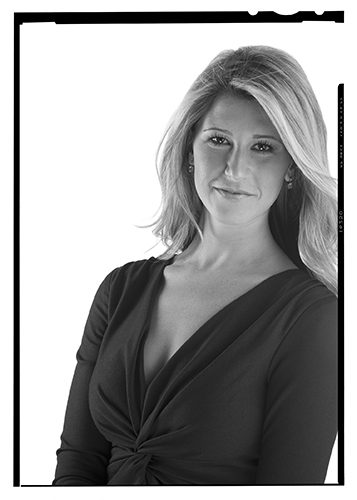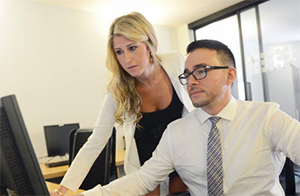Entrepreneurs Corner: Stefani Markowitz

By Victoria Ingalls
1. What experience would you say triggered your interest in the real estate business?My family led the way for me to get into the real estate business. My grandfather, Richard Friedman, brought Rutenberg to Manhattan in 2007 but he had, for years, been developing the idea and been involved in numerous lucrative real estate deals. Basically, you could say my interest was triggered from hearing about real estate around the kitchen table. From a young age, he taught me all about the business, how the Rutenberg model was different, and what it would take to be a success in New York City. I speak with him every day to discuss the future of the company and to get his perspective on how to be a great leader and how to inspire our team.
2. How long ago did you decide you wanted to run your own brokerage and how long did it take to achieve? Why?Since I was high school, I knew that if I followed the path my grandfather was laying out for me, I’d one day end up running this brokerage. Thinking back more than ten years now, the plan came together as I thought it would: I got my license; found some great mentors to learn how to do deals the right way; built up a practice; researched different models; and worked with some great clients. When the time was right, I came over to Rutenberg.

I know that some people have a hard time with the real estate exam, but I had sort of been getting ready for it for a while. I studied a lot, so I found it all pretty straightforward. The only thing I remember is getting the date for the test. The time had come, I was truly embarking on my career, so I remember the date and looking forward to beginning.
4. What do you see as the main challenges for commercial and residential real estate brokerage businesses? Do you see this changing in the short to medium (3-5 year) time frame?The biggest challenge for the real estate business has been the Internet, and that transformation is only going to accelerate over the next five years. So much of what a traditional broker used to be responsible for from the head office is now being supplanted by computers on the client side. Having a Main Street shop, mailing out postcards, all of that seems so old fashioned now. Our company’s 100% commission model was designed to be very efficient with low overhead, and combined with computer programs that are getting more powerful every day, we’re empowering agents to do more from their iPhone than was possible by the biggest company with thousands of support staff, even 10 or 15 years ago. The business will always be about relationships and service, but computers will do more of the heavy lifting. The question for an agent is, how much commission should you have to give up if all your leads are coming from your hard work and ads you’ve posted online?
5. Tell us a little about your business and about your typical day?At 6 am, I’m already at the Tracy Anderson studio. I run up the steps, stow my bag and get ready for the most intense workout anywhere, ever. I studied movement and kinesiology in college and Tracy would basically be the curriculum! We’re dancing, high kicking, jumping, free arms and then with weights, getting our heartbeats to race. By 8am I am in the office before everyone else, because, otherwise, it’s hard for me to get cracking on my stuff, before helping them with theirs. By noon, I am famished. I usually keep lunch healthy, with a Sweetgreens salad (their kale Caesar is awesome!) or a delicious chopped salad from Fred’s at Barneys. Most days, I end up leaving the office in the afternoon to check in with developers, tour new buildings or get to industry events. Once I’m back in the office, no matter how busy I am, I make a point of calling my grandfather, just to touch base. Towards the end of the day, I check in with the agents that are at the office, offering support and high fives, especially when they’re coming by to pick up their commission checks. By 7 pm or so, I try to leave the office, either for a dinner with colleagues or to a charity or networking event before a final email check around midnight, and calling it a day!
6. What are your favorite projects you are working on currently?Last year, I introduced a full real estate education curriculum, built around seminars from industry leaders and specialists to support agent needs. This was a big favorite because it brought the agents together in a way that we could facilitate team building and encourage collaborative work, and also get everyone exposed to fresh thinking about our business from the experts and guest speakers who come through our training center. I also formed a partnership with Wounded Warriors to fast-track veterans into second careers with the company, which has also become one of my favorite projects right now. For me, helping vets get back into the job market is really rewarding, and I think having people with that tough-as-nails mindset is really good for our larger community of agents because they see how really focused people do a job and, through hard work, can become very successful in this business.
7. If someone came to you now to ask for advice about starting a real estate brokerage firm what would you say?My advice would be to hire good, quality people. Use your resources and accept support from others. Now, why start a brokerage when your skill set might be doing the deals, rather than administering them? In terms of advice, I like to say that people should do what they are very best at. In my experience, most agents who are really successful are great at the deal, great at winning new clients and great at generating referrals. If I run into a person like that today, I’d say that rather than start a real estate brokerage, join ours! We’ll take care of the administration, the paperwork, the rules and regulations, and you can do your deals. Our 100% commission model was really designed for that type of agent.
8. Outside of business what are your favorite activities?Tracy Anderson workouts in the morning, playing tennis during the summer, spending time with my family on the weekends, and my great group of girlfriends at least one night a week. Meeting up with fellow millennial entrepreneurs to discuss one another’s experiences is always fascinating. I also do a lot of philanthropic work for different organizations, including The New York City Rescue Mission, City Harvest and Race for the Cure, plus the real estate divisions of a lot of other big fundraising charities. I love taking part in all these events.



